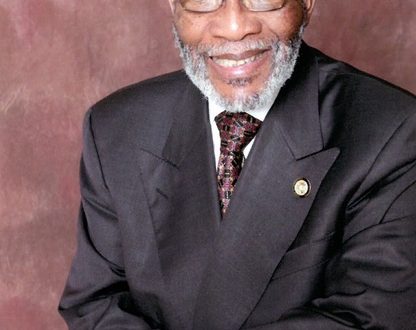By Antonio? ?Ray? ?Harvey? ?|? ?California? ?Black? ?Media?
Pastor Amos BrownThe California Task Force to Study and Develop Reparations Proposals for African Americans will hold its ninth meeting this week on April 13 and April 14 at Third Baptist Church in San Francisco.
Both days, sessions begin at 9 a.m.
During the meeting, the task force plans to discuss the challenges some members say the committee has been having with communications organizations it has hired to develop public information campaigns and handle public relations.
The firms — the Ralph J. Bunche Center for African American Studies at the University of California Los Angeles (UCLA); Young Communications Group, a Los Angeles-based PR firm; and A/B Partners, a national social impact firm — are contracted to work with the task force through the California Department of Justice.
Task force chair Kamilah Moore expressed “concerns” with the communications firms at the task force’s March 29th meeting, questioning their ability to successfully perform the work the nine-member panel has assigned to them.
“We have given these (communications firms) upward of $1 million to do a job and they are not doing it by virtue of what has been stated in the contract,” Moore said of the issue from her perspective. “This is a serious concern. This has to be addressed sooner rather than later. We have to have a comprehensive conversation about this at our next meeting. We may have to open up the process again (to hear other communications firms) about what they can do and what deliverables they can bring to this process.”
One of the firms “missed at least two deliverables” in January and February, and the other two groups gave out a “wrong email” when they were asked for an address to a website about task force inquiries, Moore said.
Concerns about the communications firms are related to seven “anchor organizations” charged with conducting community “listening sessions,” according to Moore.
The anchor organizations — different from the communications firms – are tasked with hosting public listening sessions in April, May and June, said task force member Dr. Cheryl Grills, a professor of psychology at Loyola Marymount University.
The “anchor orgs,” as they are referred to in meetings, will help the task force hear various perspectives of Black Californians as it assesses the extent of the state’s involvement in slavery and Jim Crow discrimination.
Grills took issue with Moore raising concerns about the communications firms, specifically bringing up allegations involving her, without giving prior notice before speaking about them in public.
Pushing back, Grills publicly said Moore met with an attorney that “organizes” and “convenes” meetings for the anchor organizations a week before the task force’s eighth meeting held March 29 and March 30. Moore did not lodge any complaints with the attorney, Grills stated.
“You didn’t raise any concerns, so then you bring it up in a public forum,” Grills told Moore during the meeting. “You cast a potentially negative light on the communications firms and the Bunche Center. That feels unfair to me. From a process perspective, this is troubling to me how you are operating.”
The task force’s vice chair Amos Brown is the pastor of Third Baptist Church, where the next meeting will be held. It is located at 1399 McAllister in San Francisco.
On the first day of the April meeting, the history of discrimination at colleges and professional education institutions and the school-to-prison Pipeline will be discussed.
On the second day, the task force will preview its first report.
On the afternoon of April 14, the communications firms will present their strategies for responding to press inquiries, facilitating meetings for the anchor organizations and educating the California public on report findings.
The Ralph J. Bunche Center for African American Studies was founded in 1969 as the Center for Afro-American Studies It was renamed in 2003 for diplomat, scholar, activist, and UCLA alumnus Ralph J. Bunche, who was the first Black person the win the Nobel prize.
According to its website, the Bunche Center supports research that expands the knowledge of the history, lifestyles, and sociocultural systems of people of African descent. It also “investigates problems” that have relevance to the psychological, social, and economic well-being of persons of African descent.
Recently, the work the task force is doing has been garnering national attention. But members say they must implement a stronger communications and public relations strategy leading up to the release of its findings.
By statute, the task force must issue a report to the Legislature by June 1, 2022. Their findings will be available to the public.
Other task force members who have fielded complaints about the communications firms are Sen. Steve Bradford (D-Gardena), Assemblymember Reggie Jones-Sawyer (D-Los Angeles), and San Diego City Councilwoman Monica Montgomery-Steppe.
Brown told the nine-member panel that “communications have to be at an optimum.”
He told his colleagues that the task force must leverage mainstream media, and Black-owned newspaper reporters, editors, and publishers should be contacted and informed of the group’s activities.
The civil rights leader said that Black churches, nonprofits that do community activism, and social organizations should have inside knowledge of the task force leading up and after the reports are submitted to the state legislature.
“We’re in the driver’s seat. We have to tell them what we want to be done without delay,” Brown said of the communications firms. “If they can’t fulfill it … we might have to make a change.”
 Westside Story Newspaper – Online The News of The Empire – Sharing the Quest for Excellence
Westside Story Newspaper – Online The News of The Empire – Sharing the Quest for Excellence





